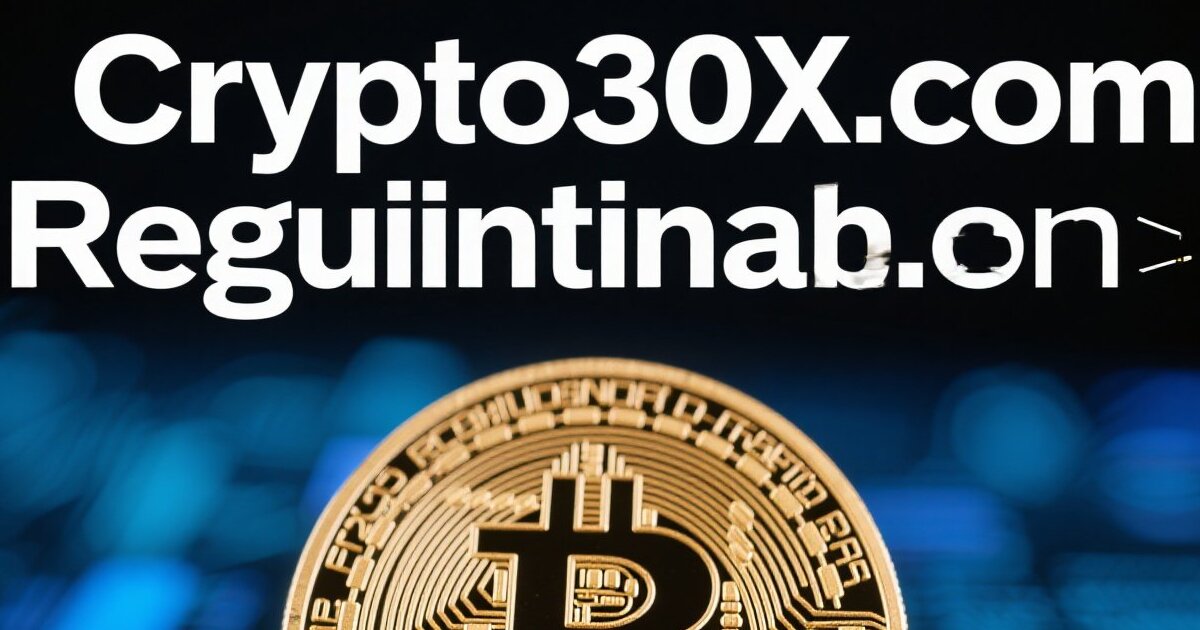I. Introduction: The Regulatory Crossroads of Crypto Trading
Over the past decade, cryptocurrency has evolved from a niche innovation to a trillion-dollar global market. What began with Bitcoin’s whitepaper in 2008 has transformed into a complex ecosystem of trading platforms, decentralized finance (DeFi) protocols, and AI-powered investment tools. As crypto adoption accelerates, governments and investors face one undeniable truth — regulation is no longer optional.
Crypto30x.com, a platform claiming “30x growth potential” through high-leverage trading and AI-driven analytics, has attracted attention in 2025. Yet, many traders are questioning its regulatory legitimacy. Is it a compliant platform or a potential risk zone for investors?
This article explores Crypto30x.com’s regulatory status, compliance gaps, and the broader legal environment of crypto trading in 2025 — helping users make informed, data-backed decisions in a volatile market.
II. What Is Crypto30x.com Regulation?
Launched in 2022, Crypto30x.com positions itself as a high-performance trading hub offering AI-powered insights and up to 30x leverage for experienced traders. It operates under a Digital Asset Service Provider (DASP) license from Malta, a nation known for its crypto-friendly regulatory stance.
However, there’s an important distinction: being licensed in Malta does not mean global regulation. The platform lacks registration with major oversight bodies like the U.S. SEC, UK FCA, or EU ESMA — limiting its credibility and legal protection for users in many regions.
In essence, Crypto30x.com’s Malta license may allow limited operations within the EU, but global recognition and enforcement of investor protections remain uncertain.
III. Why Regulation Matters in the Crypto Industry
Regulation in the crypto sector is not about restricting innovation — it’s about building sustainable trust. Proper oversight ensures that investors’ funds are secure and that platforms operate transparently. Key pillars include:
- Investor Protection: Safeguards user deposits and enforces fair-trading standards.
- Anti-Money Laundering (AML): Prevents illicit fund movements and fraud.
- Market Integrity: Minimizes manipulation and wash trading.
- Legal Recourse: Gives investors legal options in disputes.
Without regulation, users face heightened risks — from rug pulls to frozen withdrawals. As crypto scams grow more sophisticated, regulation serves as the shield separating opportunity from exploitation.
IV. Crypto30x.com’s Regulatory Position: What We Know
Absence from Major Regulatory Databases
Crypto30x.com does not appear in global financial registries such as the SEC (U.S.), FCA (U.K.), CySEC (Cyprus), or MAS (Singapore).
Malta Licensing Status
While it holds a DASP license in Malta — aligning with EU crypto frameworks — this license is geographically limited and not globally enforceable.
Lack of U.S./U.K. Authorization
Without registration in the U.S. or U.K., the platform may not legally offer trading services to users in these countries.
Unclear Transparency
There is minimal publicly available data on the company’s founders, compliance team, or corporate structure. Additionally, no proof-of-reserves or independent audits are verifiable online — raising concerns about fund management transparency.
V. Regulatory Benchmarks for Licensed Crypto Platforms
Legitimate and regulated crypto exchanges are typically required to:
- Conduct KYC (Know Your Customer) verification.
- Maintain AML compliance under international standards.
- Hold segregated custody accounts for user assets.
- Undergo independent financial audits regularly.
- Display transparent license numbers and corporate registration details.
While Crypto30x.com partially meets some of these standards, it lacks full compliance with recognized international regulatory frameworks — a red flag for cautious investors.
VI. Global Crypto Regulation Snapshot (2025 Overview)
- United States: Overseen by SEC, CFTC, and FinCEN — enforcing securities, derivatives, and AML laws.
- European Union: Under MiCA (Markets in Crypto-Assets Regulation) — mandating transparency, reporting, and consumer protection.
- Asia-Pacific: Countries like Japan, Singapore, and South Korea enforce strict licensing through FSA, MAS, and FIU.
Given these evolving global standards, Crypto30x.com’s Malta license limits its ability to operate in multiple high-compliance jurisdictions.
VII. The Risks of Using Unregulated or Partially Regulated Platforms
Trading with unregulated exchanges exposes users to several serious risks:
- High Leverage Exposure: 30x leverage can multiply profits — but also catastrophic losses.
- Withdrawal Restrictions: Users have reported delayed or frozen withdrawals.
- No Legal Protection: Lack of oversight means no guaranteed fund recovery in case of fraud.
- Data Security Concerns: Unverified claims of data encryption and system audits.
- Market Manipulation: Lack of external monitoring can lead to unfair trading conditions.
In the crypto world, “high reward” often shadows high risk, especially without credible regulation.
VIII. How to Verify a Platform’s Regulatory Status
Before trading, investors should follow these due diligence steps:
- Search official databases (SEC, FCA, MAS, CySEC) for the company name.
- Check the website footer for license numbers and registered addresses.
- Read reviews on Trustpilot, Reddit, or professional forums.
- Examine legal documents and whitepapers for compliance claims.
- Contact support to request licensing verification or proof-of-audit reports.
Performing this verification helps traders identify credible platforms and avoid potential scams.
IX. The Benefits of Proper Regulation for Investors
Proper regulation transforms crypto trading from speculation to sustainable growth. It provides:
- Trust: Builds institutional and retail confidence.
- Safety: Protects investor assets through custody laws.
- Transparency: Ensures audits, proof-of-reserves, and public reporting.
- Reduced Fraud: Makes manipulation and insider trading harder.
- Legal Protection: Enables recourse for lost or frozen funds.
Regulation doesn’t kill innovation — it refines it, ensuring long-term viability and investor protection.
X. Crypto30x.com Regulation and the Path Ahead
With MiCA enforcement, FATF guidelines, and SEC crackdowns tightening global standards, platforms like Crypto30x.com must adapt or risk obsolescence. To gain credibility, the company should:
- Apply for multi-jurisdictional licenses (SEC, FCA, MAS).
- Increase corporate transparency — reveal founders and compliance officers.
- Implement enhanced KYC/AML frameworks.
- Publish public proof-of-reserves and audit reports.
Post-2025, only platforms meeting global compliance benchmarks will retain investor trust and market share.
XI. Conclusion: Proceed with Caution and Informed Judgment
In summary, Crypto30x.com operates with limited regulatory coverage under a Maltese DASP license and lacks oversight from top-tier authorities like the SEC or FCA. While it offers attractive leverage and AI-powered features, its transparency and compliance gaps warrant caution.
Before trading, investors should:
✅ Verify all licenses.
✅ Use demo accounts before depositing real funds.
✅ Avoid excessive leverage exposure.
Remember: In crypto, opportunity and risk travel together — your safety lies in research, regulation, and responsible trading.
XII. FAQs — Crypto30x.com Regulation
1. Is Crypto30x.com fully regulated?
No. It holds a DASP license in Malta but is not registered with major authorities like the SEC, FCA, or ESMA.
2. Can U.S. or U.K. users trade on Crypto30x.com?
Officially, no. Without authorization from U.S. or U.K. regulators, the platform may not legally serve those jurisdictions.
3. What license does Crypto30x.com hold?
It operates under a Digital Asset Service Provider (DASP) license issued in Malta.
4. What are the main risks of using unregulated exchanges?
Risks include fund loss, lack of legal recourse, poor data security, and market manipulation.
5. How can I verify a crypto platform’s legitimacy?
Check regulatory databases (SEC, FCA), verify license numbers, and seek third-party audit confirmations before investing.










